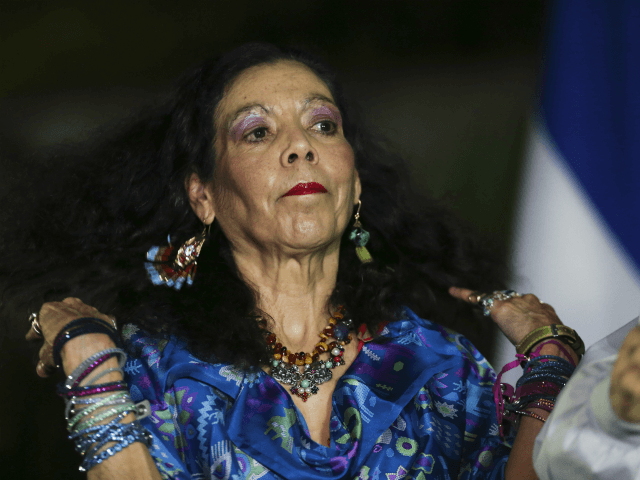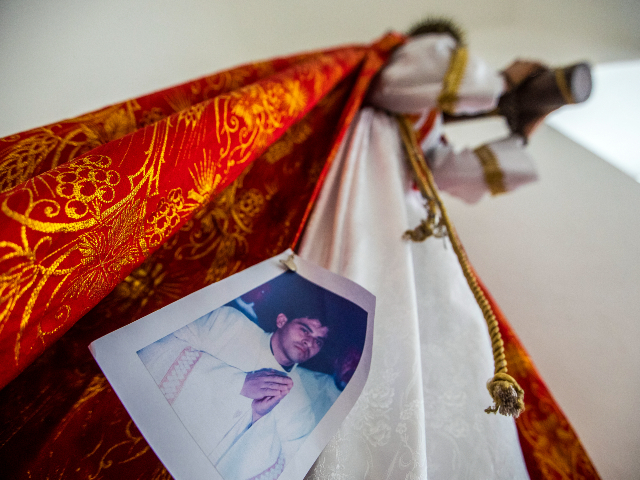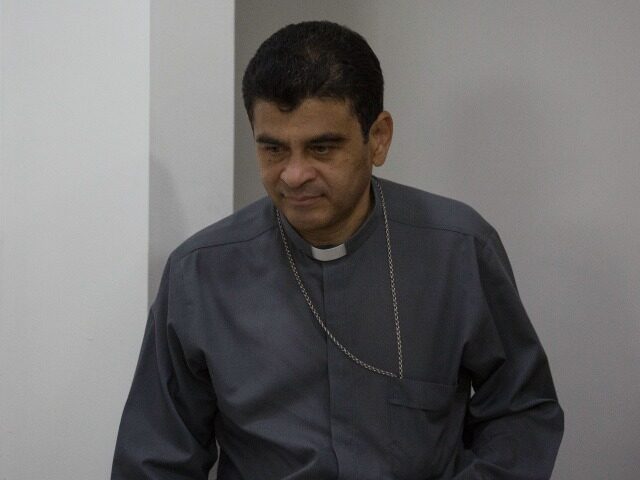The communist Sandinista regime of Nicaragua sent Matagalpa Bishop Monsignor Rolando Álvarez back to prison on Wednesday after negotiations between the Vatican and the Ortega regime failed to secure his release, according to the local newspaper, Confidencial.
Monsignor Álvarez, one of the most outspoken critics of Nicaragua’s regime and the first member of the Nicaraguan Catholic Church arrested since dictator Daniel Ortega returned to power in 2007, was sentenced to 26 years in prison for “treason” in February. The Ortega regime also stripped the priest of his Nicaraguan citizenship, rendering him a stateless person.
Ecclesiastical and diplomatic sources told Confidencial that the Vatican sent diplomatic representation to Managua to negotiate Álvarez’s release and exile, but the clergyman refused to leave the country.
Álvarez similarly refused to be expelled from his country in February, when the Ortega regime banished 222 Nicaraguan political prisoners and dissidents to the United States, stripping them of their Nicaraguan citizenship. The Ortega regime retaliated against Álvarez by sentencing him one day later.
“The only circumstance in which Monsignor Alvarez would agree to go into exile is if Pope Francis asks or orders him to do so, and that has not happened before, nor has it happened in the talks they held this week with a diplomatic representative of the Vatican,” the source explained to Confidencial.
CNN en Español reported Wednesday that a source had informed its reporters that Álvarez was transferred from his prison cell to a building of the Nicaraguan Episcopal Conference while negotiations for his possible release took place.
Honduran Bishop José Antonio Canales, who claims to know Álvarez personally and keeps track of his situation, asserted on his Facebook page Wednesday that Alvarez “does not want to leave Nicaragua.”
“He wants to be free, without conditions, in his country,” Canales continued.
Álvarez was arrested in August alongside other members of the Catholic Church at the end of a two-week-long raid of his parish by Nicaraguan authorities. The Ortega regime ordered the raid shortly after Rosario Murillo, Nicaragua’s vice president and dictator Ortega’s wife, accused Álvarez of having committed “sins against spirituality.”

Nicaragua’s first lady and then-vice presidential candidate Rosario Murillo looks on during a short talk to the media and supporters after casting her ballot in Managua, Nicaragua, on November 6, 2016. (AP Photo/Esteban Felix)
Prior to his sentence in February, the priest was placed under house arrest.
Since sentencing him in February, the Ortega regime has kept the priest imprisoned in La Modelo, one of Nicaragua’s most infamous prisons and torture centers.
Álvarez had not been seen for over a month since he was transferred to La Modelo in February, prompting a pressure campaign by local and international human rights organizations demanding proof of life for Álvarez.
The Ortega regime responded to the pressure by showing Álvarez on state-owned media outlets in March. The visibly thinner priest was allowed visits by two of his siblings, sharing a meal under the watchful eyes of the Ortega regime.
On June 28, the Inter-American Commission on Human Rights (IACHR) demanded Álvarez’s immediate release, giving the Ortega Regime a deadline of July 7 to process the release and duly inform the court of the priest’s release process.
The Court also ordered that Álvarez be guaranteed “dignified treatment through immediate access to health services, medicines and adequate food, as well as facilitating his contact with family members and lawyers” until he was freed.
Although Ortega ordered Nicaragua out of the Organization of American States (OAS) in November 2021 and forcefully expelled OAS’s representatives in 2022 without complying with the two-year timeframe the organization’s charter requires for withdrawal, the IACHR asserted in 2021 that it had jurisdiction over Nicaragua because that timeframe had not expired.
The IACHR also granted precautionary measures to Bishop Álvarez and his family in April after the court deemed them to be at a “serious, urgent risk of suffering irreparable harm to their human rights.”
Similarly, the International Religious Freedom or Belief Alliance, a 37-country organization, demanded the priest’s liberation in a statement issued on June 28.
The statement read:
Since his conviction in February, Nicaraguan authorities have allowed Bishop Álvarez only one visit. This was made by his brother and sister in March this year at the Sistema Penitenciario Nacional Jorge Navarro in Tipitapa following international pressure. Government authorities surveilled and televised the entire visit, including an interview with the bishop. The government has otherwise held the Bishop incommunicado, without access to his family or to his lawyer.
“Since his family’s visit in March, authorities have not allowed any other visits and made no further information available regarding Bishop Álvarez’s well-being,” the concerned statement explained.

An image of Bishop Rolando Alvarez is pinned to a robe on a statue of Jesus Christ at the Cathedral in Matagalpa, Nicaragua, on August 19, 2022. (AP Photo/Inti Ocon)
The arrest of Bishop Alvarez and his 26-year sentence is part of dictator Ortega’s self-described “war” against the Vatican and the Nicaraguan Catholic Church that started as retaliation for the church’s support of pro-democracy dissidents during protests in 2018.
Ortega has dramatically escalated persecution of the Catholic Church in Nicaragua since 2022 with actions such as banishing the papal nuncio, Archbishop Waldemar Stanislaw Sommertag, and other Church members from the country; suspending Nicaragua’s ties with the Vatican; shutting down Catholic media and universities in the country; banning Catholic processions throughout the year; and freezing the Church’s bank accounts.
Ortega’s persecution is not popular in Nicaragua, a majority-Catholic country. On Thursday, the regional polling agency CID Gallup released the results of a survey conducted in June that found 79 percent of Nicaraguans reject Álvarez’s sentence.
Christian K. Caruzo is a Venezuelan writer and documents life under socialism. You can follow him on Twitter here.

COMMENTS
Please let us know if you're having issues with commenting.